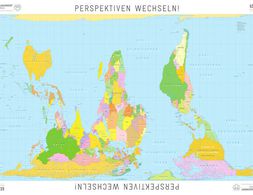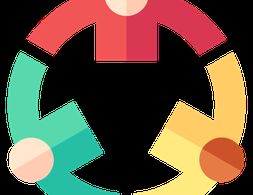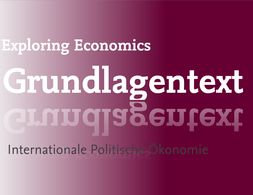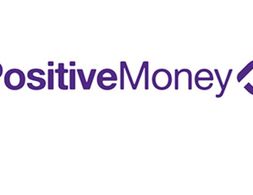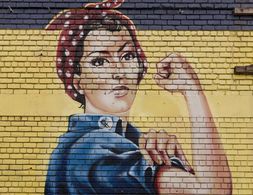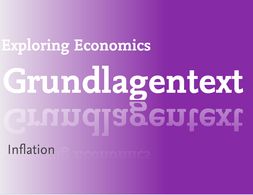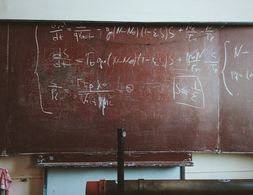305 Ergebnisse
Foundational economy is the most important concept you have never heard of. The foundational encompasses material utilities like water, gas and electricity and providential services like education, health and care. Taken together, these services matter economically and politically because they are the collectively consumed infrastructure of everyday life, the basis of civilization and should be citizen rights.
Modern Monetary Theory and Practice: An Introductory Text is an introductory textbook for university-level macroeconomics students. It is based on the principles of Modern Monetary Theory (MMT).
The Philosophy of Economics Foundational Text provides a systematic and well-structured overview over the field of philosophy of economics.
Oft werden Universitäten mit neutraler Wissenschaft verbunden und das von Dozierenden vermittelte Wissen als Abbildung der Realität wahrgenommen. Nur selten ist es Gegenstand kritischer Auseinandersetzungen. Wissenschaft findet jedoch in keinem neutralen Raum statt, sondern ist von Machtstrukturen und somit auch oft von diskriminierenden Denkweisen geprägt. Genau hier setzt unser Projekt an, mit dem wir einen Beitrag zur kritischen, interdisziplinären Auseinandersetzung mit Rassifizierung und Diskriminierung an der Universität Bayreuth und darüber hinaus leisten wollen. Unser Interesse am Thema Rassifizierung im Kontext universitärer Lehre und Forschung entstammt dabei der kritischen Auseinandersetzung mit den Lehrinhalten der Vorlesung „Ökonomik der Entwicklungsländer“ von Prof. Dr. Martin Leschke sowie mit dem begleitenden Lehrbuch „Ökonomik der Entwicklung – Eine Einführung aus institutionenökonomischer Sicht“. Als uns Themen und Begriffe auffielen, die unserer Einschätzung nach in ihrer Verwendung nicht dem aktuellen Umgang mit postkolonialen Machtverhältnissen und Eurozentrismus entsprachen, kam uns die Idee, eine kritische Begleitschrift zu besagtem Lehrbuch zu verfassen.
Free, Fair & Alive is a foundational re-thinking of the commons, the self-organized social systems that human beings have used for millennia to meet their needs.
What’s inflation? Why is it relevant? And is there an agreed theory about its roots and causes, or is it a contentious concept? That’s what this text is all about: We define what inflation actually means before we delve into the theoretical debate with an interdisciplinary and pluralist approach: What gives rise to it, what factors might influence it, and, consequently, what might be done about it?
This Perspective argues that ergodicity — a foundational concept in equilibrium statistical physics — is wrongly assumed in much of the quantitative economics literature. By evaluating the extent to which dynamical problems can be replaced by probabilistic ones, many economics puzzles become resolvable in a natural and empirically testable fashion.
This course seeks to interpret capitalism using ideas from biological evolution. The lectures are foundational on neoclassical economics and economist, as well as their roles in the proliferation of capitalist ideology. However, it is less concerned with the ultimate judgment of capitalism than with the ways it can be shaped to fit more specific objectives.
A short course introducing co-operative firms, in the context of the Candian economy where various forms of co-operative make up a significant sector of the economy. The course offers foundational knowledge about co-operatives, explaining what they are and how they operate.
In "The Money Problem, "Morgan Ricks argues for a reform of the American monetary system. Taking up foundational questions of monetary policy, he asks: how would we construct a monetary system if we were starting from scratch? What are the characteristics of a monetary instrument?
The first day of the workshop is intended to initiate students to the foundational concepts of ecological economics. Ecological economics is an ecological critique of economics, applying the energetics of life to the study of the economy. It also investigates the social distribution of environmental costs and benefits. It does so by deconstructing concepts that are taken for granted like “nature” or “the economy”, excavating their ideological origins.
Complexity economics and institutional economics are complementary approaches to studying the economy. They can pool their methods and foundational theories to explain the mechanisms that underlie economies.
In diesem Text aus der Reihe "Exploring Economics - Foundations" werden die Grundlagen der Internationalen Politischen Ökonomie als interdisziplinäre wissenschaftliche Strömung dargestellt.
This classic text offers a broader intellectual foundation than traditional principles textbooks. It introduces students to both traditional economic views and their progressive critique.
In economics the dominant framework for exploring the structure of market economies is provided by the neoclassical school of thought. This text aims to show how neoclassical theory is used to model market mechanisms, both in particular markets and in the market economy as a whole.
Geld und Sprache sind das „Band der menschlichen Gesellschaft“ (Cicero). Im vorliegenden Text wird die menschliche Sprache als soziale Form, als Prozess der Vergesellschaftung rekonstruiert und das damit verbundene Denken daraus entwickelt als Logos. Das Geld stellt logisch und historisch ein Novum innerhalb dieser Vergesellschaftung dar, das zu einer sich immer weiter einlagernden berechnenden Vernunftform (Ratio) führt. Diese wachsende Dominanz der Ratio über den Logos charakterisiert den Prozess der Modernisierung und erlaubt zugleich ihren inneren Gegensatz aufzudecken. Es zeichnet sich schließlich in der völligen Verdinglichung der Ratio in der Künstlichen Intelligenz eine neue Weise der Vergesellschaftung ab, worin die Herrschaft des Geldes in neuer Form reproduziert wird.
Ecological economics explores new ways of thinking about how we manage our lives and our planet to achieve a sustainable, equitable, and prosperous future. Ecological economics extends and integrates the study and management of both "nature's household" and "humankind's household"—An Introduction to Ecological Economics, Second Edition, the first update and expansion of this classic text in 15 years, describes new approaches to achieving a sustainable and desirable human presence on Earth.
Economics: A New Introduction provides a fresh introduction to real economics. Highlighting the complex and changing nature of economic activity, this wide-ranging text employs a pragmatic mix of old and new methods to examine the role of values and theoretical beliefs in economic life and in economists understanding of it.
The text presents a short perspective of International Political Economy, which "have often sought to complement discussions of governance with a healthy dose of critique", on resistance against e.g. economic inequality or economic and political power.
Welche Denkschulen bestimmen heute den volkswirtschaftlichen Diskurs und wie haben sie sich entwickelt? Von der Neoklassik über den Keynesianismus und Friedmans neoklassische Gegenrevolution bis hin zum "Neuen Konsens der Makroökonomik" stellt der Text die wichtigsten Strömungen vor.
The page "Positive Money" gathers text and short videos which explain how money is created by banks by giving loans. It furthermore presents the consequences of this process on housing prices, inequality and the environment and its role in the financial crisis. The dossier is provided by the campaign "Positive Money" which aims at a democratic control over money creation. Besides texts by the campaign, the page makes available links to journal and conference articles on the topic. The page focuses on the banking system of the UK.
This text provides an overview of feminist perspectives on various kinds of work and reproductive labour. The authors start at the intersection of Marxism and Feminism. They, then, give a historical background on the United States feminist movement. They, finally, provide alternative perspectives on work and reproductive labor that are not based on Marxist Feminist theory.
How does fiscal policy work and which dimensions have to be considered? In this short text, you can learn about the difficulty of juggling different dimensions and which optimal rules exist at the micro and macro level.
This Forum in the Boston Review deals with the role of economics in modern policymaking and presents a wide set of perspectives on the topic. The opening text by Suresh Naidu, Dani Rodrik and Gabriel Zucman aims to answer a range of common criticisms against the modern, neoclassical science of economics and its influence on public discussions.
Was ist Inflation? Warum ist sie relevant? Und gibt es eine einheitliche Theorie über ihre Wurzeln und Ursachen, oder ist sie ein umstrittenes Konzept? Genau darum geht es in diesem Text: Wir definieren, was Inflation eigentlich bedeutet, bevor wir uns mit einem interdisziplinären und pluralistischen Ansatz in die theoretische Debatte stürzen: Wie entsteht sie, welche Faktoren können sie beeinflussen, und was kann man dagegen tun?
This text summarizes the content of the 2018 Nobel Prize winner W. Nordhaus. It is extended by some critical perspectives on this topic. The short dossier gives an overview of the most important texts we have read in the climate economics reading group.
Der Text klärt zunächst den Begriff der Metaphysik, der sich auch bei Adam Smith finden lässt. Es zeigt sich, dass die Metaphysik ein formales Schema ist, in dem wissenschaftliche Aussagen formuliert werden, ohne dieses Schema selbst zu reflektieren. Die Wirtschaftswissenschaften erscheinen in Forschung und Anwendung als formal exakte Theorie, die der physikalischen Mechanik bis in die mathematischen Details gleicht. Die Mechanik fungiert hier als verborgene Metaphysik.
Goethes Faust II, genauer das erste Kapitel wurde vielfach als eine Geld- und Inflationstheorie gelesen. Obgleich darin viele Motive anklingen, die in der Erklärung des Geldes eine Rolle spielen, so ist es doch ein Missgriff, Goethe als ökonomische Autorität zu lesen. Allerdings stand er allerdings in regem Austausch mit zeitgenössischen Ökonomen, deren Erkenntnisse weitgehend vergessen wurden. Gerade darin finden sich viele Elemente für eine Theorie und Philosophie des Geldes. Im Text werden zahlreiche dieser Einsichten vorgestellt und im Kontext der Faust-Dichtung vertieft. Die Figur des Mephistopheles als des „neuen“ Narren erweist sich dabei als wichtige Leitfigur für das Verständnis monetärer Prozesse jenseits der Vorurteile einer traditionellen Quantitätstheorie.
Kilian de Ridder argumentiert in diesem Text, dass die EZB in ihrer aktuellen Konstruktion eine Institution ist, die aus heute überholten Theorien heraus entstanden ist. Die EZB hat das Mandat der Preisstabilität, was bedeutet, sie zielt auf eine niedrige, aber positive Inflation von 2 Prozent ab. Das hauptsächliche Instrument, das wir ihr für die Erfüllung dieses Mandats an die Hand gegeben haben, ist der Leitzins. Dieser stellt sich als überraschend unpraktisch für dieses Ziel heraus, weil er keine spezifischen Sektoren adressieren kann, sondern nur die gesamte Wirtschaft.
The Nobel laureate Amartya Sen´s text analyzes three main figures in social sciences and the relation between them: the Italian economist Piero Sraffa, the Austrian philosopher Ludwig Wittgenstein, and the Italian politician and philosopher Antonio Gramsci.
Gender, Development, and Globalization is the leading primer on global feminist economics and development. Lourdes Benería, a pioneer in the field of feminist economics, is joined in this second edition by Gunseli Berik and Maria Floro to update the text to reflect the major theoretical, empirical, and methodological contributions and global developments in the last decade.
Geographical economics starts from the observation that economic activity is clearly not randomly distributed across space. This revised and updated introduction to geographical economics uses the modern tools of economic theory to explain the who, why and where of the location of economic activity. The text provides an integrated, first-principles introduction to geographical economics for advanced undergraduate students and first-year graduate students, and has been thoroughly revised and updated to reflect important developments in the field, including new chapters on alternative core models and policy implications.
Wir nutzen Cookies. Klicke auf "Akzeptieren" um uns dabei zu helfen, Exploring Economics immer besser zu machen!




